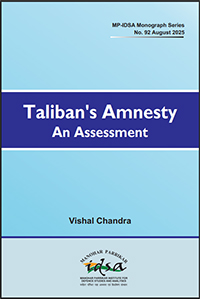Taliban’s Amnesty: An Assessment
- 2025 |
- Monograph
About the Monograph
The Taliban’s unwritten and ambiguous ‘general amnesty’ neither implies political integration nor national reconciliation. It’s about total control, and about who gets to stay and who gets to come back, and on what terms. In the absence of any credible political opposition, and with more and more Afghans being deported or forced to return to the country, including the exiled members of the previous regime, the Taliban’s Contact Commission will remain in business in the foreseeable future.
However, reports of violation of ‘general amnesty’ by the Taliban members, particularly in the case of mid and low ranking former military personnel, have exposed the limitations to the implementation of the amnesty decree across the country.
About the Author
Mr Vishal Chandra studies Afghanistan at Manohar Parrikar IDSA, New Delhi. He joined MP-IDSA in 2003 and is currently a Research Fellow with the South Asia Centre of the Institute. He has travelled in Afghanistan and has participated in various national and international academic forums. He has delivered talks & lectures on Afghanistan at India’s leading training academies and institutes. He is the author of the monograph, Afghans in Need: Positing India’s Continued Engagement with Afghanistan, MP-IDSA, October 2024; and the book, The Unfinished War in Afghanistan: 2001–2014, IDSA, Pentagon Press, New Delhi, 2015. Reviews of his book on Afghanistan have been published in The Journal of Slavic Military Studies, Indian Foreign Affairs Journal, India Today, The Book Review, and The Pioneer. He has recently authored an Occasional Paper, Taliban’s “Contact Commission”: Three Years Later, MP-IDSA, July 2025; and a Special Feature, The Why and What of Non-Inclusivity and Dissensus in the Taliban ‘Emirate,’ MP-IDSA, November 2024. Mr Chandra also had a decade-long editorial stint with the Institute’s website, including as the Editor Website from 2019 to 2022.
Keywords: Afghanistan, Taliban






